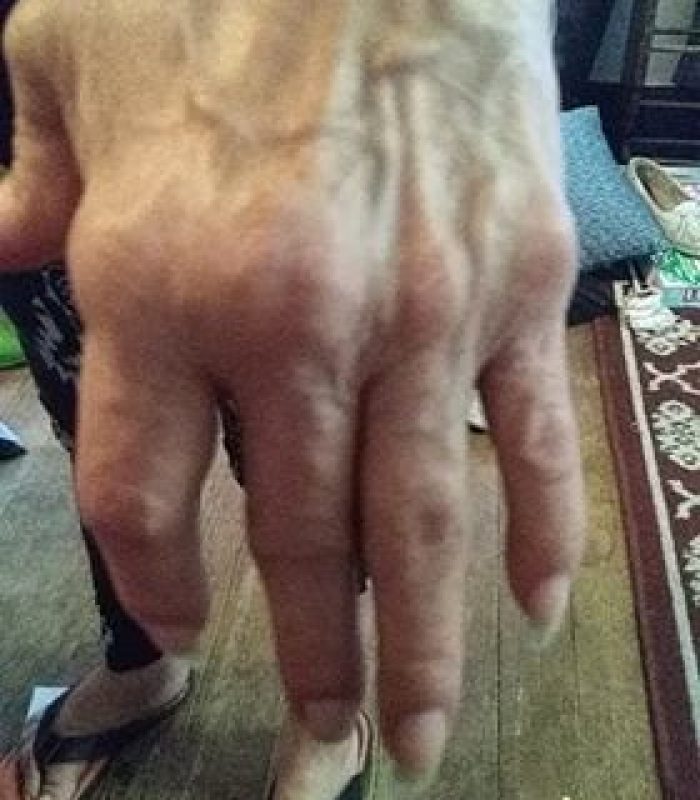I had a work accident and the pain in my hip made all thing unbearable.
About six months after a work accident, I felt like someone shoved a sword into my hip. I would get vibrations that would not go away, they would manifest into an annoying-pain vibration as though the sword was being twisted.
The daily things I took for granted (walking, sitting, sleeping) were constantly being affected and my pain became unmanageable. Just the thoughts of pain would transcend into feeling the pain and the neurosis took over the quality of my life.
Pain Takes The Ability to Live in the Present
The ability to live in the present was substituted with dealing with pain levels at the moment. My pain left me unable to enjoy hunting, fishing or gardening. I was always trying to get comfortable, that’s all I could do. Just constantly shifting the pain, especially when I was sitting on hard surfaces.
Then I had a synthetic disc put in my back and was told by my surgeon that there is no pill to cure my pain, just a pill to band-aid it. So I took 800 milligrams of Gabapentin a day, other pain pills, and used alcohol to help with the pain. However, the most comfort I have found is in cannabis.
Generally, I use different strains through out the day to control the pain levels. If the pain is bad enough I use a vape or pipe. I will roll before going to sleep as well, and will smoke again in the middle of the night to go back to sleep if I need to.
I have a lot of scare tissue and arthritis which the cannabis helps with. Since I’ve started cannabis, it has led me back to being able to enjoy fishing and hunting again.
Medical cannabis has allowed me to enjoy the things I took for granted, and to live in the present. I guess that’s why they call it a gift. My opinion is if everyone was able to grow their own medical cannabis the only people would get hurt is the pharmaceutical industry.
The Science on Chronic Hip Pain, From RxLeaf
Chronic hip pain can disrupt everything about life. The fidgeting and constant attempts to get comfortable can make a physical problem into much more. Efforts to combat the constant agony overwhelms the mind, transforming normal days in endurance contests.
That’s why it can be so easy to fall into the realm of addiction. It’s natural to go to great lengths to find relief from unceasing discomfort.
Pain pills and alcohol are common steps on the journey toward addiction. But cannabis can help fight addiction while offering a better long-term solution for chronic pain.
Pills Aren’t Enough for Chronic Hip Pain
Doctors commonly prescribe the medicine given to this patient, Gabapentin, for chronic hip pain. It not only eases discomfort, it also helps control tremors and restless leg syndrome. All three of which it ideal for this condition— and easily replaceable by cannabis.
Cannabis has also shown great potential in treating restless leg syndrome. The new insights, recently published in the journal Sleep Medicine, found that using cannabis gave people with severe Restless Leg Syndrome (RLS), “complete improvement.”
The cannabinoid CBD also has a remarkable ability to stop tremors in their tracks.
But most importantly cannabis also helps with pain — and not just in one way. As the patient above demonstrates, different chemovars can bring relief to different forms of pain. There are three basic kinds of pain: nociceptive pain, which originates in the tissues and includes everything from bee stings, blisters, nausea, arthritis, and more. Next is neuropathic pain. This pain comes from damage to the nervous system itself. Many diseases can cause it too. People commonly call this “nerve pain.” Finally the third kind of pain – “other pain” which includes inexplicable or hard-to-classify suffering fibromyalgia, irritable bowel syndrome, nonspecific lower back pain, and the like.
Disorders like chronic hip pain often result in all three types of pain, making it especially agonizing. Broken bones and damaged tissue can cause nociceptive pain for years. Damage to the nerves, arising from an auto or workplace accident, may lead to severe neuropathic pain. Add to that the complications from surgery, and the repeated odd movements to find comfort, and you may have other kind of pain.
Research on Cannabis for Inflammation, Neuropathic Pain, and Nociceptive Pain
All three types of pain need treatment in order for a patient with chronic hip pain to find relief. And cannabis can do just that.
Cannabis can treat inflammation disorders, like arthritis, with aplomb. And, thanks to a study published in the Journal of Bone and Mineral Research (2015), [1]Kogan, Natalya M, et al. (2015). “Cannabidiol, a Major Non-Psychotropic Cannabis Constituent Enhances Fracture Healing and Stimulates Lysyl Hydroxylase Activity in Osteoblasts”. Journal of Bone … Continue reading we already know that CBD is effective at treating bone pain. Both of these are examples of nociceptive pain.
What’s more, a study utilizing brain imaging techniques showed exactly how THC, the active psychotropic compound in cannabis, helps alter brain connectivity to reduce neuropathic pain. Published in the journal Neurology (2018), the study shows patients taking THC felt far less lower back and spinal cord pain than the participants taking a placebo.
How to Consume Cannabis for Chronic Pain
Taken together, these studies suggest that, just as the patient above shows, different chemovars or strains of cannabis have different benefits, and all can be effective in managing chronic hip pain.
Instead of trying to choose between high-THC and high-CBD chemovars, it may be best to get both for patients with intense and multifaceted cases of chronic pain.
Consumers who want to truly go in-depth, should also consider which terpenes are best for pain treatment and select chemovars that high in myrcene and caryophyllene.
Different kinds of pain require different solutions — but cannabis is always there to help.
References
References







